Intergovernmental activity update Q3 2023
This update gives an overview of intergovernmental activity of relevance to the Scottish Parliament between the Scottish Government and the UK Government, the Welsh Government, and the Northern Ireland Executive during quarter three (July-September) of 2023.
Introduction
SPICe publishes quarterly updates to give an overview of intergovernmental activity. 'Intergovernmental activity’ refers to work between governments – in a Scottish context between the Scottish Government and the UK Government or other devolved governments. It can include discussions on areas of mutual interest, policy development, and policy implementation. Read more about what intergovernmental activity is and why awareness of it is an essential element of parliamentary scrutiny on our SPICe blog. SPICe has also launched an intergovernmental activity hub that collates information on intergovernmental activity of relevance to the Scottish Parliament.
Updates are published on the last Thursday of the month following the end of the reporting period. The next quarterly update, covering quarter 4 (October-December) of 2023, will be published on 25 January 2024. This update reflects information available at the time of publication.
Highlights
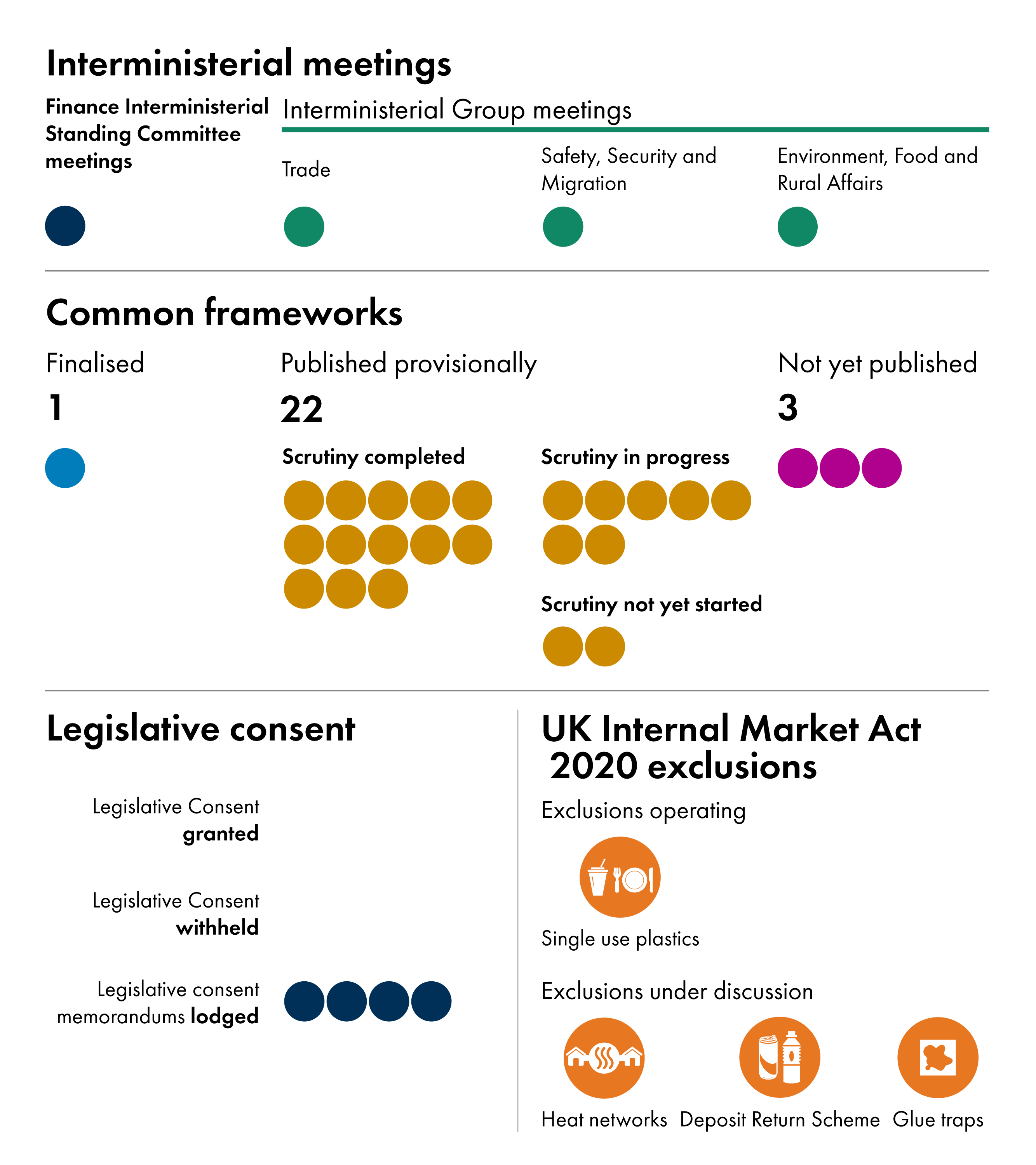
Intergovernmental activity
Formal intergovernmental interactions take place under the following structure, which has been in place since January 2022.
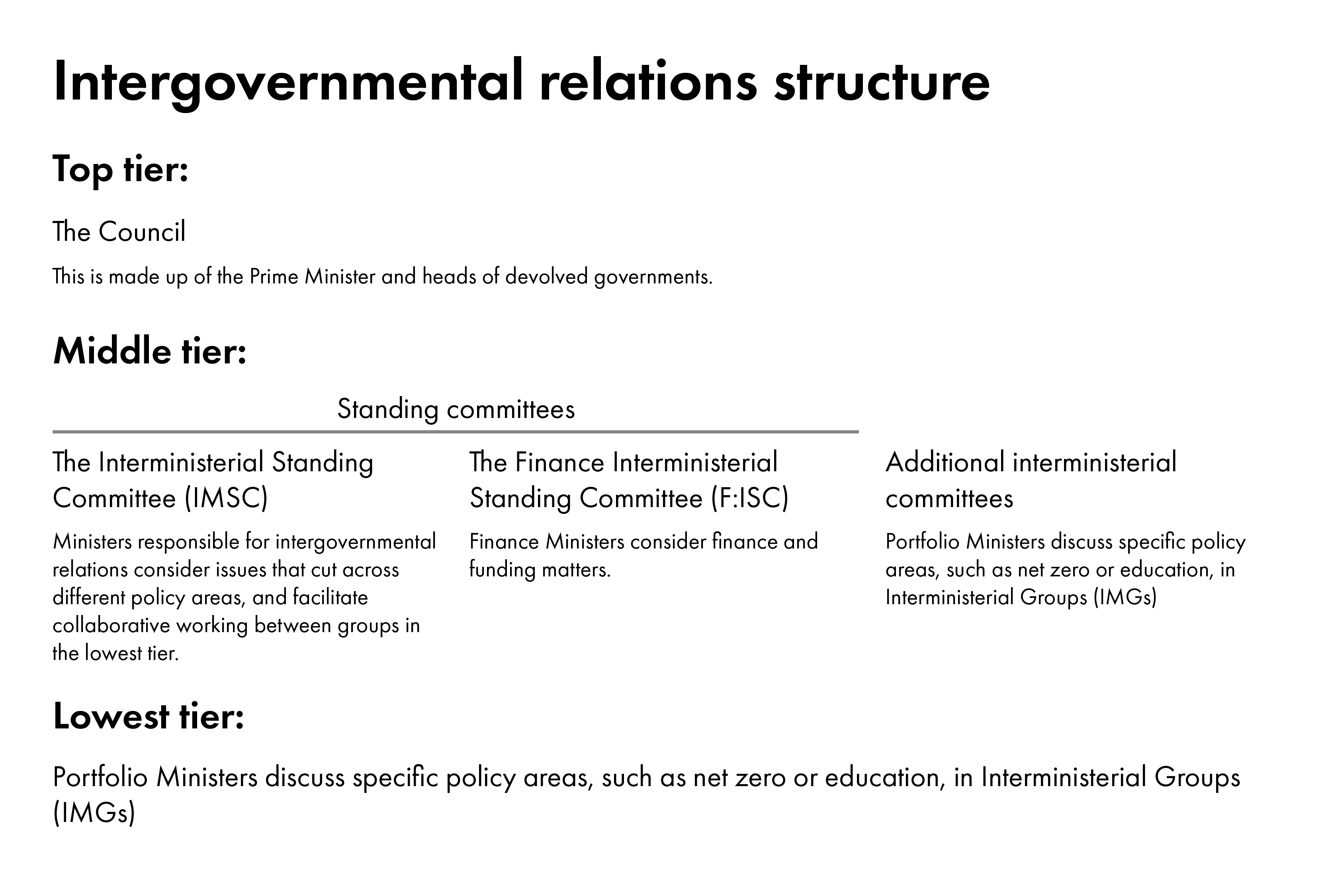
See a SPICe blog for more information on how the new structure operates.
Interministerial meetings
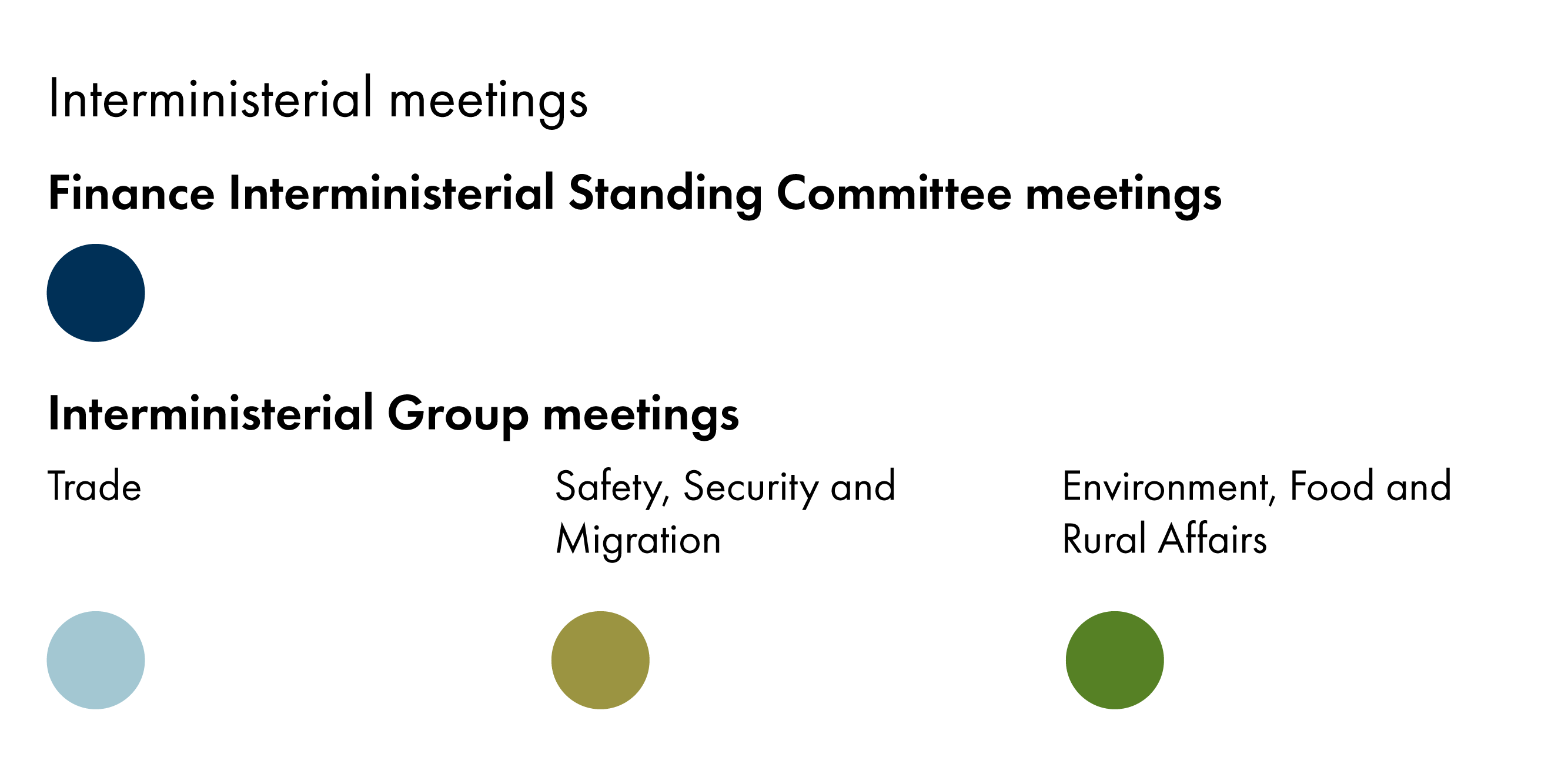
The Finance Interministerial Standing Committee met on 20 September 2023.
Ministers discussed their economic and fiscal priorities, challenges related to Reinforced Autoclaved Aerated Concrete, and energy security.
The Scottish Government provided an update on its recently agreed Fiscal Framework Review. The UK Government and Scottish Government agreed to update the Fiscal Framework in July 2023.
Interministerial Groups (IMGs) met three times during the reporting period:
The Interministerial Group for Safety, Security and Migration met on 11 July 2023. It discussed issues relating to safety, security and migration and agreed the importance of closer relations and effective cooperation in these areas. No more detailed information is provided in the accompanying minutes.
The Interministerial Group for Trade met on 7 September 2023. It discussed ongoing negotiations and ministerial engagements with bilateral and multilateral trading partners, including negotiations for the UK-India free trade agreement, the UK-Canada free trade agreement, and the accession of the UK to the Comprehensive and Progressive Agreement for Trans-Pacific Partnership.
The Interministerial Group for Environment, Food, and Rural Affairs met on 13 September 2023. Discussions included the implementation of the Windsor Framework, COP28, and engagement with devolved governments on free trade agreements. The meeting also included a presentation by the Scottish Government on its plans to ban the sale and possession of glue traps and its interaction with the UK Internal Market Act 2020 (see section on UK Internal Market Act Exclusions for more information).
Common frameworks
Common frameworks are intergovernmental agreements which set out how governments will work together to make decisions about policy in certain devolved policy areas, in particular decisions about policy divergence. Common frameworks were originally intended to be used to consider matters which were former EU competences, however, some also state that they may be used to consider related matters within the wider policy area. Read more about what common frameworks are on our intergovernmental activity hub.
No new framework agreements were published during the reporting period. The image below provides an update on frameworks relevant to Scotland and scrutiny of frameworks at the Scottish Parliament.
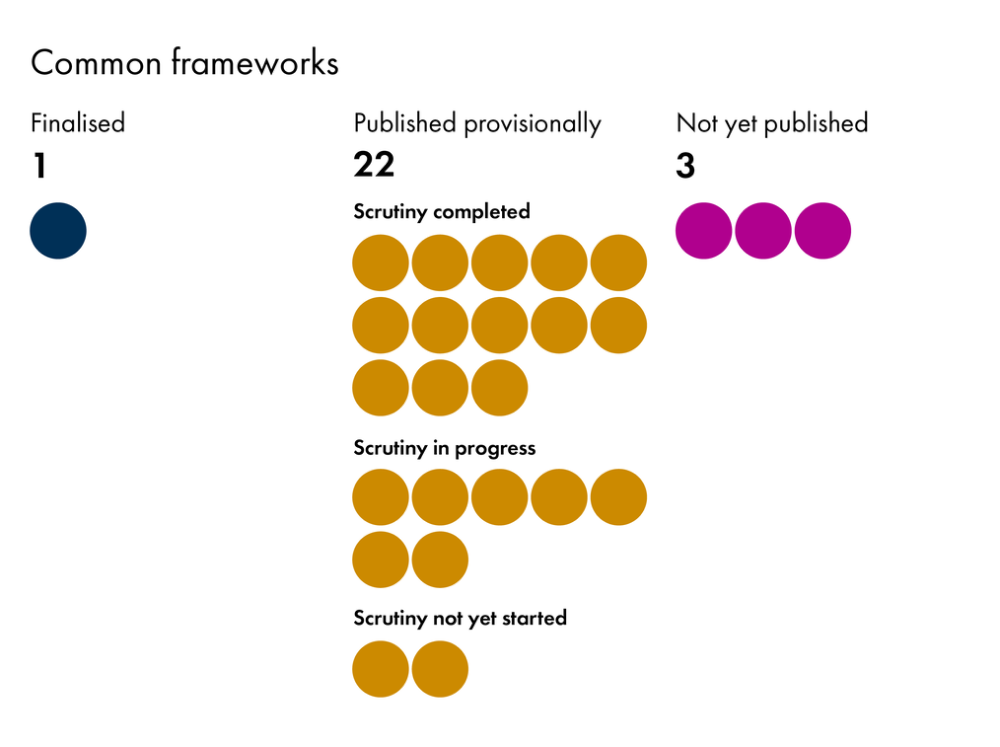
No scrutiny of framework agreements took place in the Scottish Parliament during the reporting period.
UK internal market
The UK Internal Market Act 2020 is UK-wide legislation about the flow of goods and services. You can read more about the Act's provisions in our SPICe briefing and a SPICe blog.
UK Internal Market Act exclusions
A process has been established by which the UK Government and devolved governments can consider exclusions to the market access principles of the UK Internal Market Act 2020 ('UKIMA'). Read more about the interaction between the exclusions process and common frameworks in our SPICe blog.
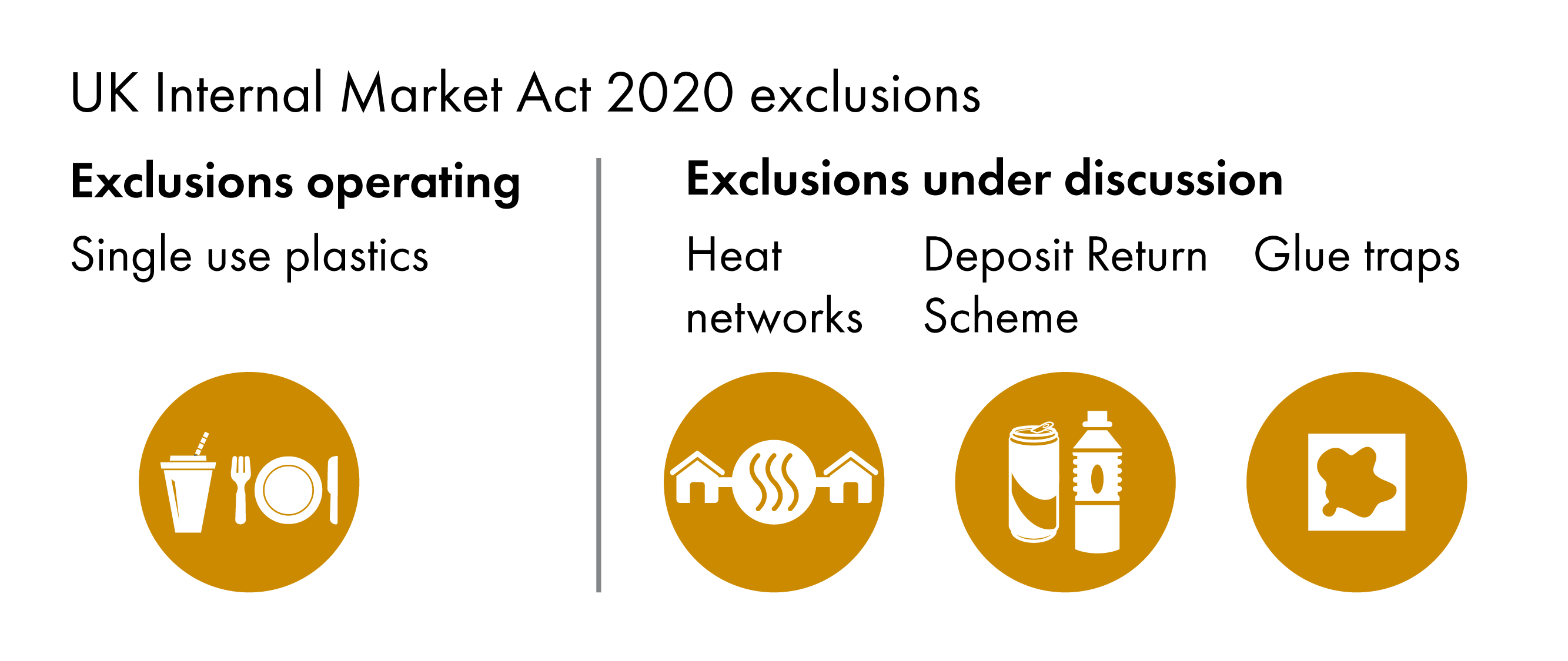
Discussions about a UKIMA exclusion relating to a Scottish Deposit Return Scheme took place in previous quarters. The UK Government offered a temporary, narrower exclusion than the one requested by the Scottish Government, which the Scottish Government cited as the reason for its delay of the scheme until at least October 2025. See SPICe blogs for background about the scheme and further information about intergovernmental discussions regarding an exclusion. Most recently, on 26 September 2023 the Scottish Government's Minister for Green Skills, Circular Economy and Biodiversity gave an update in evidence to the Net Zero, Energy and Transport Committee on the Deposit Return Scheme, and discussions with the UK Government.
Discussion regarding two additional potential UKIMA exclusions have taken place over the reporting period:
The draft United Kingdom Internal Market Act 2020 (Services Exclusions) Regulations were laid on 7 July 2023. If made, the legislation will provide an exclusion for heat networks. Correspondence made available by the Scottish Government through a Freedom of Information request indicates that the Scottish Government had sought a broader exclusion, covering both heat networks and heat regulation. As of 25 October 2023, the instrument is under consideration in the UK Parliament.
In a letter to the Rural Affairs and Islands Committee dated 29 September 2023, the Minister for Energy and the Environment, Gillian Martin MSP, confirmed that discussions were ongoing about an exclusion for glue traps. The exclusion relates to the Scottish Government's plans to ban both the sale and possession of glue traps through the Wildlife Management and Muirburn (Scotland) Bill, which is currently under consideration in the Scottish Parliament. While the Welsh Government has banned the use of glue traps and the UK Government has similar plans using powers provided under the Glue Traps (Offences) Act 2022, only the Scottish Government is currently proposing to ban their sale.
Look out for: potential further developments over coming quarters
The letter from the Scottish Government's Minister for Energy and the Environment to the Rural Affairs and Islands Committee regarding a potential UKIMA exclusion for glue traps states:
Initial discussions on that paper took place at the inter-ministerial group for environment, food and rural affairs meeting on 11 September and it was agreed at that meeting to hold further discussions at the next inter-ministerial group meeting in November 2023, where the Scottish Government will seek to confirm that all parties have sufficient evidence for consideration of an exclusion and to agree next steps, including indicative timelines.
The UK Government asked the Office for the Internal Market to produce a report on its proposed regulation banning sales of peat and peat-containing products in England. The Office for the Internal Market published its report in February 2023. It stated:
We expect the proposal to have some impact on the patterns of trade in peat-containing growing media across the internal market. However, the overall impact on trade in growing media more generally will be modest because most, if not all, manufacturers currently producing peat-containing growing media are also able to manufacture peat-free growing media.
There have been no statements from the UK Government about a wish to apply for an exemption to prevent the sale of peat and peat-containing products in England.
Legislative consent
According to the Sewel Convention, the UK Parliament will not normally legislate on devolved matters without the consent of the Scottish Parliament. The Scottish Parliament’s standing orders set down rules which apply where UK primary legislation requires the Parliament’s consent under the Sewel Convention. They apply where UK primary legislation makes ‘relevant provision’, which means provision which applies to Scotland in any of the following ways:
for any purpose within the legislative competence of the Scottish Parliament
to alter the legislative competence of the Scottish Parliament
to alter the executive competence of the Scottish Ministers.
When any of the criteria on relevant provision are fulfilled, a member of the Scottish Government is obliged to lodge a legislative consent memorandum. A legislative consent memorandum, amongst other things, sets out the Scottish Government's view on whether the Parliament should grant legislative consent.
Following the lodging of a legislative consent memorandum, members of the Scottish Parliament may vote on a legislative consent motion to agree whether it is content that the relevant provision in the Bill should be considered by the UK Parliament. Only motions seeking consent are called 'legislative consent motions' in accordance with the Parliament's standing orders. However, the Scottish Parliament has also voted on motions which seek to withhold consent. This update provides information on all motions relating to bills in respect of which a legislative consent memorandum was lodged during the reporting period. Not every legislative consent memorandum will result in a motion granting or withholding consent. Find out more about legislative consent on the Scottish Parliament's website
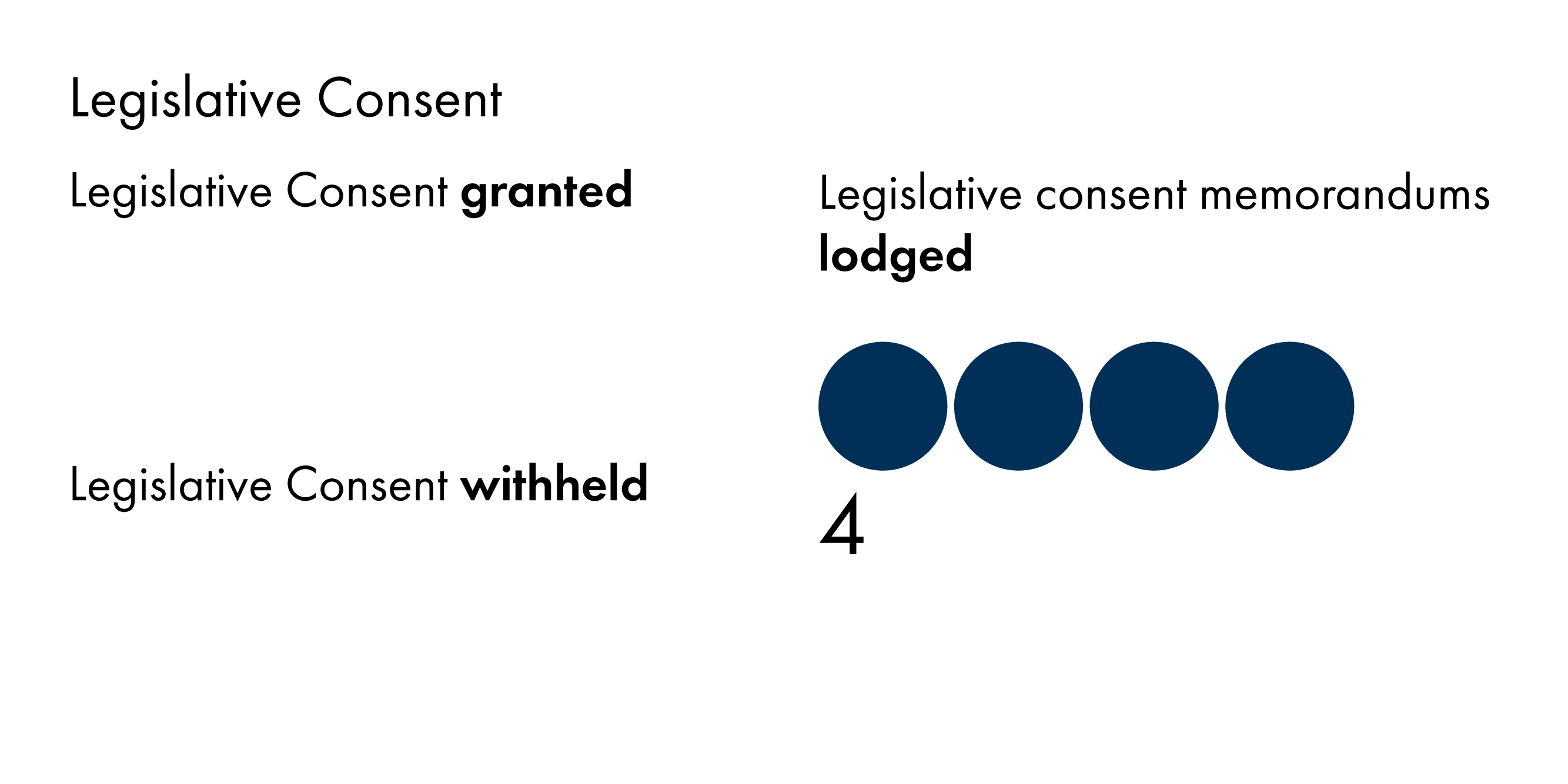
During the reporting period, no motions granting or withholding legislative consent were approved. The Scottish Government lodged four legislative consent memorandums:
| Bill title | Date motion lodged | Consent recommendation by Scottish Government |
|---|---|---|
| Economic Activity of Public Bodies (Overseas Matters) Bill | 19 July 2023 | Consent not recommended |
| Northern Ireland Troubles (Legacy and Reconciliation) Bill (supplementary) | 4 September 2023 | Consent not recommended |
| Data Protection and Digital Information (No. 2) Bill (supplementary) | 14 September 2023 | Consent recommended |
| Energy Bill | 21 September 2023 | Consent recommended |
Further information
Information within this intergovernmental update is primarily based on the following sources:
The UK Government intergovernmental relations website contains minutes of interministerial groups and standing committees. Minutes of other intergovernmental meetings are not currently published and hence are not reflected in this update.
The UK Government common frameworks website contains common framework agreements.
The Scottish Parliament legislative consent website lists legislative consent memorandums and associated motions.
Further information on intergovernmental activity can be found on our intergovernmental activity hub and:
House of Commons Library briefing on intergovernmental relations
UK Government transparency reports on intergovernmental relations
Senedd Legislation, Justice and Constitution Committee Monitoring reports
Northern Ireland Assembly Brexit and Beyond newsletters.